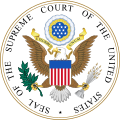Liverpool, New York & Philadelphia Steamship Co. v. Commissioners of Emigration
 | |
| Full case name | Cole v. City of La Grange |
|---|---|
| Citations | 113 U.S. 1 (more) |
| Case opinion | |
| Majority | Gray |
Liverpool, N. Y. & P. S. S. CO. v. Commissioners Of Emigration, , 113 U.S. 33 (1885) was a case decided by the United States Supreme Court, in which the court held that the plaintiff was in error, being a corporation under the laws of Great Britain, and an alien, had brought this action in the circuit court of the United States for the Southern district of New York, the defendant being a corporation of that state.[1]
The defendant was indebted to the plaintiff in the sum of one million and ninety-three thousand dollars and upwards, lawful money of the United States of America, for certain commutation moneys from the plaintiff unlawfully demanded, exacted, and received at the city of New York by the said defendant under color of certain laws in the state of New York, concerning passengers in vessels coming to the state of New York, and concerning the powers and duties of commissioners of emigration, and for the regulation of marine hospitals, and paid by the said plaintiff under the inducement of certain representations of the defendant, this plaintiff being an alien and not knowing the laws of the state of New York, and under protest at various times preceding the said tenth day of February, 1875, and in various sums, and to and for the use of the plaintiff. (4) And being so indebted, the said defendant, in consideration thereof, afterwards, to-wit, on the same day and year last aforesaid, at the place aforesaid, undertook and then and there faithfully promised the said plaintiff, well and truly to pay unto the said plaintiff, the said sum of money when,' etc., and alleging a breach thereof.
Treating it as a complaint according to the procedure under the New York Code, the defendant filed an answer setting up several distinct defenses, and, among others, the following: '(7) That by an act of congress, entitled 'A bill to legalize the collection of head- moneys already paid,' approved June 19, 1878, the acts of every state and municipal officer or corporation in the several states of the United States in collection of head-moneys for every passenger brought to the United States prior to the first day of January, 1877, under then existing laws of the several states, were declared valid, and the [113 U.S. 33, 35]
The case was cited in the dissenting opinion of Justice Thomas in Kelo v. City of New London, 545 U.S. 469 (2005).
